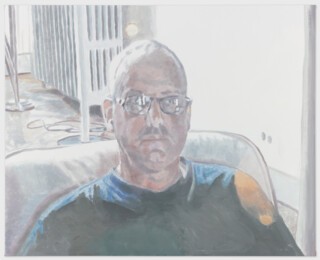Lumumba, Himmler, Me
Jason Farago
The Summer Is Over, a new exhibition in New York by the Belgian artist Luc Tuymans (until 9 February), consists of seven paintings: three pairs of canvases depicting mundane details of life in Antwerp and, alone on a wall, a self-portrait that doesn’t look much like Tuymans. The artist gazes out from the painting unthreateningly, showing none of the severity he can display in person or in photographs. His cheeks are uncharacteristically fleshy, and his full head of white hair is painted so subtly that he looks almost bald. The ubiquitous cigarette isn’t in evidence either. Nearly a third of the painting – depicting the wall over his shoulder – is simply white. Me (2011) is his first self-portrait in nearly twenty years.
Tuymans’s paintings usually depict violent passes of history or contemporary politics: an ‘inventory of death’, to borrow the subtitle of Hélène Cixous’s new book on the artist. Nobody ever said Tuymans was an easy artist to love. But the portrait – portraits of King Baudouin and Patrice Lumumba; of Heinrich Himmler with his face obliterated; and most famously of Condoleezza Rice, lips pursed and eyes squinting – has always been this reticent painter’s most accessible genre. Although he often works from photographs the final paintings feature smudged, hazy forms, with a bilious palette of greens, beiges, ochres and greys. ‘For me, it’s impossible to make a joyful painting,’ he once told an interviewer. Yet while his public pronouncements often indulge a Romantic idea of the tortured artist, this self-portrait forecloses even that retro fantasy. Here he is no miserabilist, just a guy in a snapshot, drained of psychological complexity as thoroughly as he’s drained of colour.
